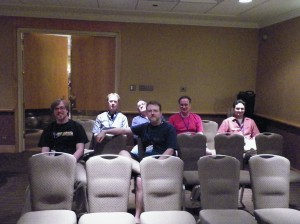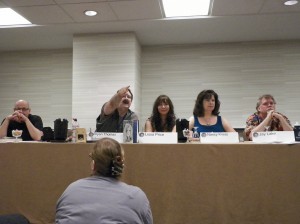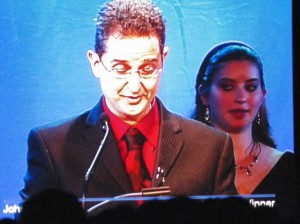I know, I’ve made two Recap posts already on ChiCon, but I couldn’t resist sharing a few special moments I’ll always remember from the experience. Both touching and humorous, they combined to enrich the experience and the memories I carry forward from it. I think you’ll see why. I present them chronologically.
1) Surviving A New Cabbie’s First Fare. Somehow, upon arriving 90 minutes late on Amtrak, 90 minutes before my reading I might add, I wound up in the taxi of a man whose driving was an adventure. Not only did make some odd lane changes but then entered the Hyatt the wrong way and had to turn around, driving across the sidewalk and scattering the bellboys in the process. “It’s my first time,” he said, “I’m new.” I didn’t argue, just handed him the money and hurried to escape the cab.
 2) Black Gate Crew Attends My First World Con Reading. I am not a big fan of doing readings. It’s just something I’ve always felt nervous and awkward about. Fortunately (or unfortunately depending how you look at it) my crowds have always been small. But this time not only did my crowd size increase but it was packed with fellow writers, many of whom were Black Gate staff. Seeing fellow successful authors like Howard Andrew Jones, James Enge and Chris Kastensmidt and a successful editor like John O’Neill not only make time to attend but express encouragement at my performance really started the Con on a great note and leant the feeling that I was on the right track as a writer. I’m grateful,
2) Black Gate Crew Attends My First World Con Reading. I am not a big fan of doing readings. It’s just something I’ve always felt nervous and awkward about. Fortunately (or unfortunately depending how you look at it) my crowds have always been small. But this time not only did my crowd size increase but it was packed with fellow writers, many of whom were Black Gate staff. Seeing fellow successful authors like Howard Andrew Jones, James Enge and Chris Kastensmidt and a successful editor like John O’Neill not only make time to attend but express encouragement at my performance really started the Con on a great note and leant the feeling that I was on the right track as a writer. I’m grateful,
3) Recognized By Robert J. Sawyer at Thursday Dinner. My first dinner, my first night at the Con, and I run into Robert J. Sawyer at the restaurant. He recognizes me, double checks my name badge to be sure, and then introduces me to his wife and companions, inviting me to stop by the bar later and chat more. I had never met Rob and only interviewed him via Twitter, but we have interacted on Facebook a bit. Still, it was a good feeling to be recognized by someone of that caliber and it was an event that repeated itself throughout the Con as several others recognized me as well and said “I know your name, sure” as they shook my hand. For a small fish, it was a big splash.
4) David Brin Thanking SFWA Volunteers. On Friday morning, I spent two hours with SFWA Secretary Ann Leckie and Edge Editor Victoria Strauss volunteering at the SFWA table. While several people dropped by, David Brin made a point to shake our hands and kindly thank us for volunteering. It was a classy move and greatly appreciated since I have always found Brin’s snarky outspoken comments on Facebook a bit offputting and since he is “David Brin” (intimidating in itself). That graciousness won me over. What a class act.
5) Meeting and Being Teased by Robert Silverberg. In many ways, Silverberg is my Tolkien. I’ve told him so. He insists that I call him ‘Bob,” to which I replied: “I don’t know if I can.” But our first face-to-face was at his signing after I’d waited around 40 minutes in line. My quota of 3 books were the original Majipoor trilogy, and a couple were used hardbacks I’d tracked down, since I prefer getting hardbacks signed for longevity. Glancing inside one, Silverberg notes the ‘Property Of Margene’ stamp. “So, what happened to Margene? And how did you get her book?” he teases. I fumbled a bit then said I’d bought it at a library sale. He smiles, shooting me a cockeyed look. “Please give Margene my best if she survived the exchange.” I couldn’t help but laugh, he smiled, we chatted a bit more, and I left hoping he really was just teasing. I swear, I don’t know Margene.
6) A fan arrives at my signing with my book. Okay, yes, my books have been out a while. But this is really the first time someone already had one when they came to a signing to get it signed. Before they’ve bought them from me, then had me sign. So it was memorable and special to know my babies are making their way out in the world and that booksellers are being supported in the process. I only wound up signing 5 books that day, while watching Seanan McGuire’s never-ending line next to me and George R.R. Martin’s before her, but it was a nice feeling to be known before hand.
 7) Moderating My First World Con Panel Ever. Not only was it my first World Con panel, but the room was packed t0 standing room only, with people waiting outside wanting to get in. On top of that, my fellow panelists included Nancy Kress, Jay Lake and Charles Stross. The lofty topic: Moral Ambiguity In Science Fiction. Having Nancy Kress, whose writing books have taught me so much, look at me for permission to talk almost made me laugh with embarrassment. Of course, that was just her showing respect to the moderator and it wound up being a delightful panel and one I’ve heard good things about from many since. In fact, we recorded it for an upcoming podcast, so you’ll get the chance to hear it soon enough.
7) Moderating My First World Con Panel Ever. Not only was it my first World Con panel, but the room was packed t0 standing room only, with people waiting outside wanting to get in. On top of that, my fellow panelists included Nancy Kress, Jay Lake and Charles Stross. The lofty topic: Moral Ambiguity In Science Fiction. Having Nancy Kress, whose writing books have taught me so much, look at me for permission to talk almost made me laugh with embarrassment. Of course, that was just her showing respect to the moderator and it wound up being a delightful panel and one I’ve heard good things about from many since. In fact, we recorded it for an upcoming podcast, so you’ll get the chance to hear it soon enough.
8 ) Mitch Bentley’s Art Show Award. Despite my friend and frequent cover artist Mitch Bentley being the first to greet me upon my arrival at the hotel, I didn’t make it to the art show until Sunday, my first free day of the Con. Imagine my delight when I found Mitch’s booth and discovered a cover I had commissioned for my ebook release of the Davi Rhii prequel story “Rivalry On A Sky Course” had won him a Judge’s Choice Award. Mitch’s art has always moved me. I knew I wanted him to do my book cover from the minute I first saw it at ConQuest 41 in Kansas City, May 2010. Since then we’ve collaborated on two novels and this ebook with more in the works. More over, the covers are inspired by the stories and scenes within them, so I am thrilled to see Mitch recognized for his work, especially stuff my own work inspired.
9) Resnick’s Recognition. I had seen Resnick in passing several times and even-handed him some Brazilian coffee grounds I’d brought for him, but apparently he was so exhausted he didn’t recognize me (many had this issue due to my new Sellect ‘stache I learned) until I handed him a signed copy of the novel he blurbed. Then he did an “of course, I hadn’t realized that was you” thing and we spent a delightful 45 minutes hanging out. Resnick has been a good friend and mentor to me and I had not expected to get much time with him at a Con where he was GOH, let alone “alone” time, so it was a delight. But the priceless look on his face when my identity connected was a highlight for sure.
10) Listening In As Silverberg and Dave Kyle Reminisce. Spotting Silverberg in the Dealer’s Room Sunday, I brought over a few more books I had not gotten him to sign and overheard a comparing notes of two long time SFF community members discussing Cons, books, life, genre and much more. It was the kind of moment that one loves being a fly on the wall. Then Silverberg saw the Ace Double I was carrying and commented: “Look Dave, this book is almost as old as you are.” Kyle quipped: “It’s in far better condition.” We all laughed and then Silverberg signed it. Their discussion though could have been a panel in and of itself.
11) An Accidental Anthology Pitch. One friend I managed to run into a lot was Jamie Todd Rubin, who gathered a bunch of us Sunday afternoon in the bar to hang out. Patrick Swenson was there, along with Kay Kenyon, Louise Marley, Jennifer Brozek, Jay Werkheiser, and later Tod McCoy. It was a fun group and we found all kinds of stuff to talk about. But somewhere along the way we happened to discuss sports, and I–off the cuff–mentioned I hoped to do a Space Sports themed anthology one day. Next thing I knew I had three very excited writers pitching their stories. Two of them would be reprints. And they were talking it up. I hadn’t intended to make it a project immediately, as I already have three in the development hopper, but Champions: Spec Sports is now in the works and I found myself gathering ideas and writers the rest of the evening. A memorable way to start an anthology project for sure.
 12) Watching Friends Accept Hugos. John DeNardo won for SFSignal to which I contribute, and Kij Johnson and Ursula Vernon won for Novella and Graphic Novel. Cat Valente and Seanan McGuire were amongst Podcast winners for SF Squeecast. Of the five, I know John the best but it was still a delight to see people I have chatted with multiple times and respect get such recognition. The fact that I helped contribute with my votes was a bonus.
12) Watching Friends Accept Hugos. John DeNardo won for SFSignal to which I contribute, and Kij Johnson and Ursula Vernon won for Novella and Graphic Novel. Cat Valente and Seanan McGuire were amongst Podcast winners for SF Squeecast. Of the five, I know John the best but it was still a delight to see people I have chatted with multiple times and respect get such recognition. The fact that I helped contribute with my votes was a bonus.
As I stated in my Recaps, it felt a lot like I’d come of age and transitioned from fan/wannabe on the sidelines to full fledged community member and that an encouraging feeling only aided by moments like these ten. If you went to World Con, what were your most memorable moments? I’d love to hear about them.
For what it’s worth…
 Bryan Thomas Schmidt is an author and editor of adult and children’s speculative fiction. His debut novel, The Worker Prince(2011) received Honorable Mention on Barnes & Noble Book Club’s Year’s Best Science Fiction Releases for 2011. A sequel The Returning followed in 2012 and The Exodus will appear in 2013, completing the space opera Saga Of Davi Rhii. His first children’s books, 102 More Hilarious Dinosaur Books For Kids (ebook only) and Abraham Lincoln: Dinosaur Hunter- Lost In A Land Of Legends (forthcoming) appeared from Delabarre Publishing in 2012. His short stories have appeared in magazines, anthologies and online. He edited the anthology Space Battles: Full Throttle Space Tales #6 (2012) and is working on World Encounters and Space & Shadows: SpecNoir with coeditor John Helfers, both forthcoming. He hosts #sffwrtcht (Science Fiction & Fantasy Writer’s Chat) Wednesdays at 9 pm ET on Twitter and is an affiliate member of the SFWA.
Bryan Thomas Schmidt is an author and editor of adult and children’s speculative fiction. His debut novel, The Worker Prince(2011) received Honorable Mention on Barnes & Noble Book Club’s Year’s Best Science Fiction Releases for 2011. A sequel The Returning followed in 2012 and The Exodus will appear in 2013, completing the space opera Saga Of Davi Rhii. His first children’s books, 102 More Hilarious Dinosaur Books For Kids (ebook only) and Abraham Lincoln: Dinosaur Hunter- Lost In A Land Of Legends (forthcoming) appeared from Delabarre Publishing in 2012. His short stories have appeared in magazines, anthologies and online. He edited the anthology Space Battles: Full Throttle Space Tales #6 (2012) and is working on World Encounters and Space & Shadows: SpecNoir with coeditor John Helfers, both forthcoming. He hosts #sffwrtcht (Science Fiction & Fantasy Writer’s Chat) Wednesdays at 9 pm ET on Twitter and is an affiliate member of the SFWA.



